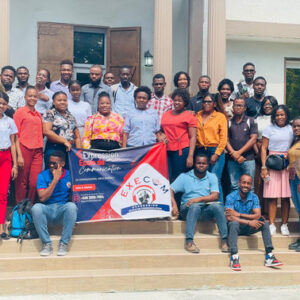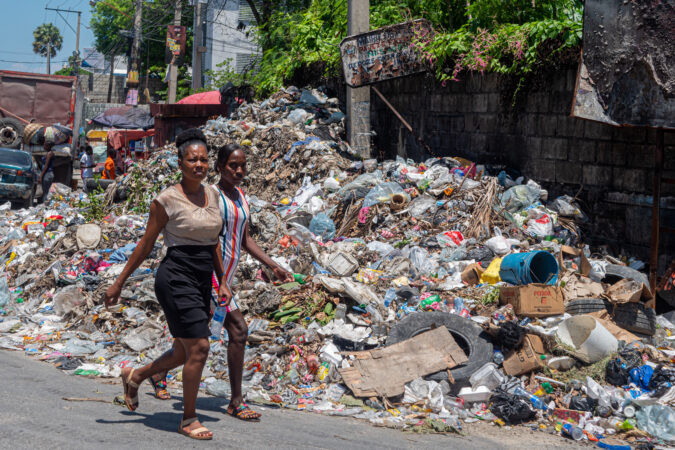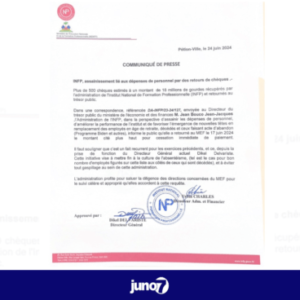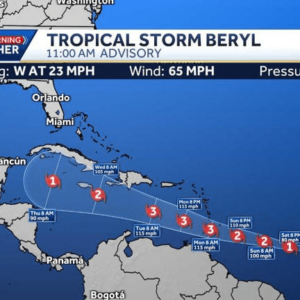Town halls contacted by AyiboPost denounce possibilities of corruption, as well as structural problems such as lack of materials and non-payment of employees
On Monday, May 20, 2024, the Presidential Council announced the launch of a sanitation operation in the capital and its surroundings to be able to “clean and beautify” the streets. A billion gourdes are planned for this purpose.
But no manager of the three town halls contacted by AyiboPost seems to have information on the management of this budget.
The mayor of Port-au-Prince, Lucsonne Janvier, informs that, during previous sanitation operations, the central state had used the service MonCash to pay contract workers.
But the problem with this method, according to magistrates in Port-au-Prince and Tabarre, is that often the people who receive the money have nothing to do with sanitation.
To avoid any scandal, Lucsonne Janvier, says that town halls then find themselves obliged to dip into their funds to pay people who were not paid even though they worked in the field.
Two people walk near a pile of garbage, not far from the Ministry of Culture and Communication, in Port-au-Prince, May 2024. | © Carvens Adelson/AyiboPost
Magistrate Lucsonne Janvier also complains about private companies which collect their clients’ waste from their homes and throw it in the streets.
Like town hall employees, these companies cannot go to dump sites due to insecurity.
Along with town halls, the National Solid Waste Management Service (SNGRS) and the Ministry of Public Works, Transport and Communications (MTPTC), are two organizations working on the problem of waste on public roads.
Each of these institutions has its well-defined role.
“Town halls collect waste,” informs the mayor of the town of Tabarre, Nice Simon. “The SNGRS, which has a budget allocated to this, has the responsibility of collecting them. And Public Works is there to clean the canals,” she explains.
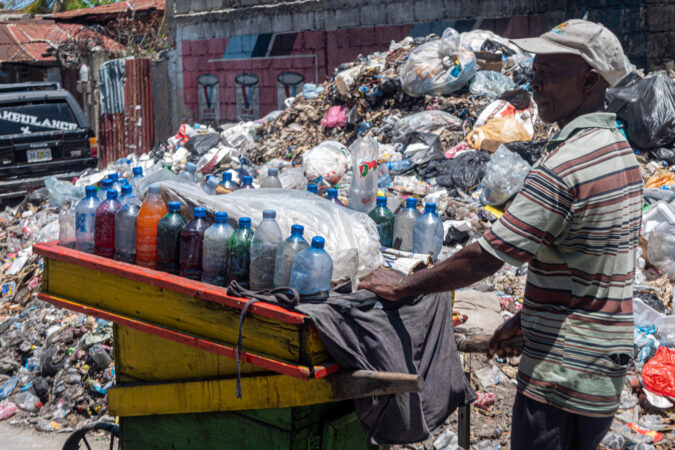
A “fresko” seller passes near a pile of piled waste in Bois-Verna, at the entrance to Rue Milfort, in May 2024.
Specializing in garbage collection, the SNGRS could very well clean the streets on its own, according to Joseph David, an employee of the organization. The problem is that the workers are on strike.
“We have not been paid our salary arrears for three years already,” he denounces. With several dozen other employees of the institution, the forty-year-old placed barricades on the road in front of the institution, the day after the announcement of the sanitation project.
These workers hope to put pressure on the Presidential Council in order to be paid and for it to dismiss the entire administrative team that they accuse of corruption.
“It’s always like this whenever there is money at stake,” says Marie Claude, a truck driver. “We’re the ones who are going to do the dirty work, but we won’t see the color of our money if they’re the ones who have to manage it,” she said.
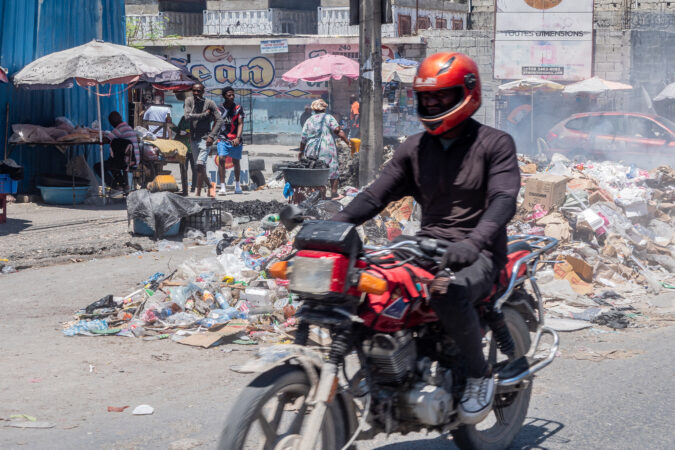
A biker rides very close to the trash piled up between Ruelle Jérémie and Route de Lalue, in May 2024.
Added to this problem are those concerning equipment.
Whether at the level of town halls or the SNGRS, the number of dysfunctional equipment, burned or in territory controlled by gangs remains considerable.
Some, like those of the SNGRS, have breakdowns estimated at around 15,000 gourdes, Joseph David, one of the drivers of these heavy machines encountered on site on May 21, 2024, told AyiboPost.
“Money for their maintenance is regularly disbursed,” he said, “but it is never used for this purpose.”
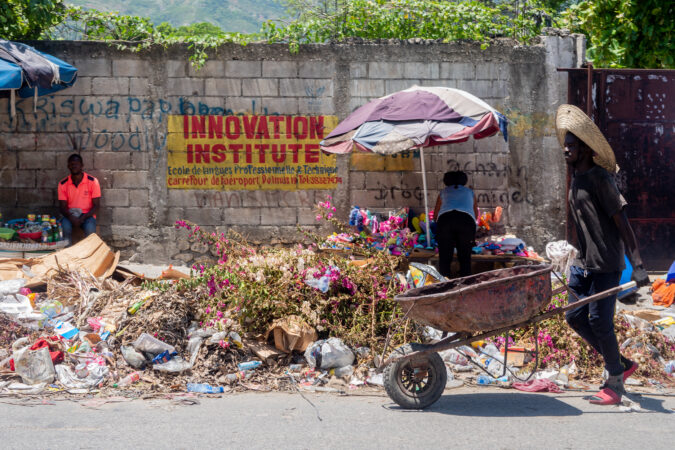
A person, holding a wheelbarrow in his hand, passes by numerous piles of rubbish piled up between ruelle Berne and rue Lalue, where there are merchants at the side of the road.
The vast majority of these materials date from January 2010, according to two other employees interviewed by AyiboPost.
Already, the materials are few in number.
Nice Simon has less than ten heavy equipment to manage waste over the 24.47 square kilometers of its municipality. “It’s four dump trucks, a bobcat, a loader, a small roller and two compressive trucks,” she says. »
The figures are worse for the town hall of Port-au-Prince.
According to Blanguy Michel Billy, the assistant head of the town hall’s roads department, there is “a single dump truck, two compressors and a box truck” to treat waste in the municipality of Port-au-Prince.
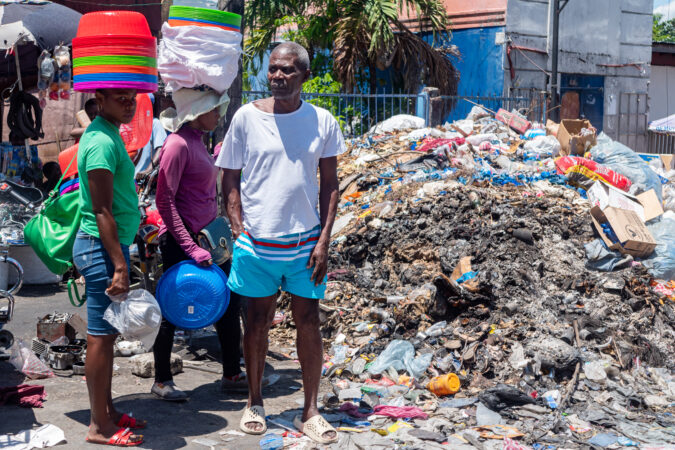
Merchants and shoppers stand near a pile of garbage in Lalue, May 2024.
Because the glaring insecurity ravaging the country seems to have a greater impact on the unsanitary conditions of the streets, several executives from the institutions concerned believe that it must be resolved so that sanitation can succeed.
“I have no problem with the project,” emphasizes Bien-Aimé Pierre Marie Lafont. Waste is also part of insecurity. “But I don’t think that’s what we need right now,” he says.
The head of the roads service at Delmas town hall is worried about the neighborhoods now elevated, he says, to the rank of “lost territories” by a former minister of justice.
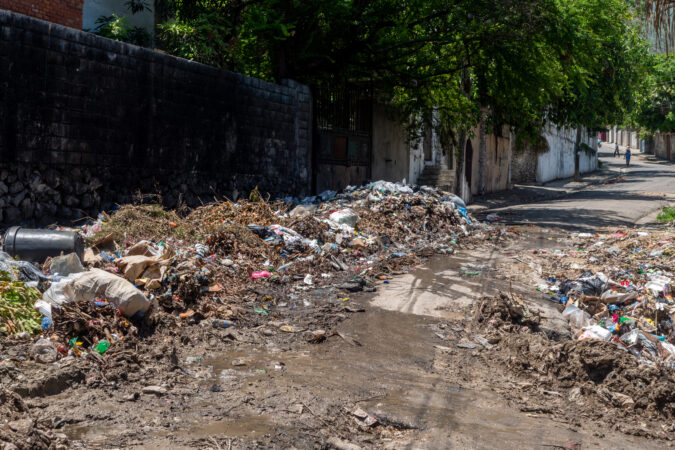
An alley in poor condition in Port-au-Prince in May 2024.
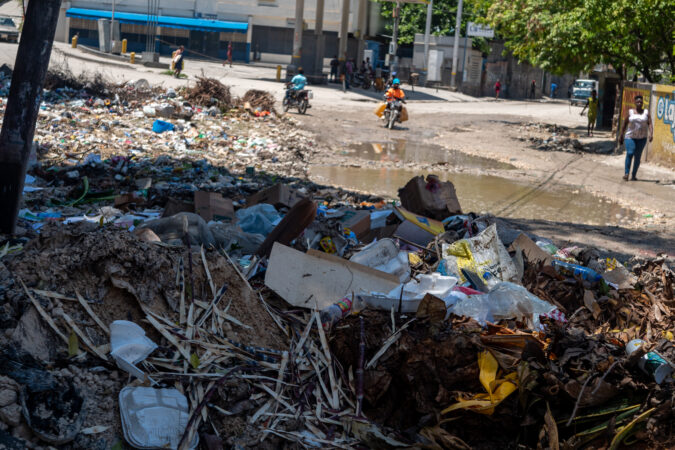
Roads cluttered with trash in Port-au-Prince in May 2024 force passers-by, bikers and car or truck drivers to find it difficult to take alternative routes.
These locations are not without risk for employees who will participate in the campaign.
Mobilizing the police and the army would risk further exposing employees, according to the mayor of Port-au-Prince, who declares that he no longer has the same confidence in the police institution.
The central state and town halls have never really had the same vision when it comes to sanitation, according to the magistrate of Port-au-Prince, Lucsonne Janvier.
“Beyond the helping hand that it intends to give to town halls, the State still sees sanitation as a means to resolve political problems,” analyzes Janvier.
According to him, politicians in power often use these moments to satisfy figures to whom they are beholden.
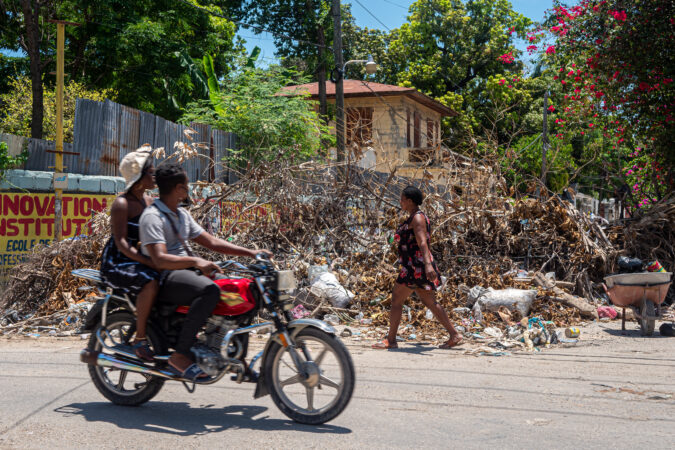
View of the cumbersome state of the premises between Ruelle Waag and Rue Capois in May 2024.
Unfavorable opinions on these initiatives are pouring in.
Sanitation in Haiti is “one of the many means used to squander money,” criticizes the head of the engineering department of Delmas town hall, Bien-Aimé Pierre Marie Lafont.
To explain, the engineer takes the very functioning of the garbage collection sector as an example.
“If a person maintains that they removed 300,000 cubic meters of waste at a rate of 100 gourdes per meter,” says Lafont, “there is no way to justify it. And if, despite everything, she was forced to provide proof, she would only have to take the applicant to Truitier.”
Read also: More and more Haitians are “looking for life” in the garbage in Port-au-Prince
Located in Cité Soleil, Truitier is a litter site where several municipalities, including Port-au-Prince, Delmas, Pétion-ville, Tabarre, Croix-des-Bouquets, dump their waste. The volume found there is colossal.
Those responsible avoid denouncing the crimes. “When we take the risk of telling the truth,” maintains Lucsonne Janvier, “we are sure to harm many people. This is the reason why we generally stay silent,” he explains.
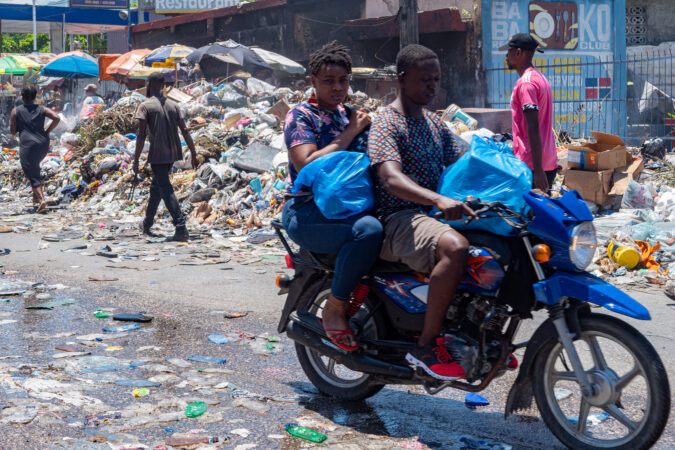
People walk past piles of garbage located very close to the Ministry of Communication in Port-au-Prince.
Par Rebecca Bruny
Carvens Adelson participated in this report.
Cover image: People walk past piles of garbage located very close to the Ministry of Communication.
The photos are from Carvens Adelson/AyiboPost.
Watch this AyiboPost interview with sociologist Jean Sergo Louis on the socio-political relationship of Haitians with waste:
Keep in touch with AyiboPost via:
► Our channel Telegram : Click here
► Our Channel WhatsApp : Click here
► Our Community WhatsApp : Click here

